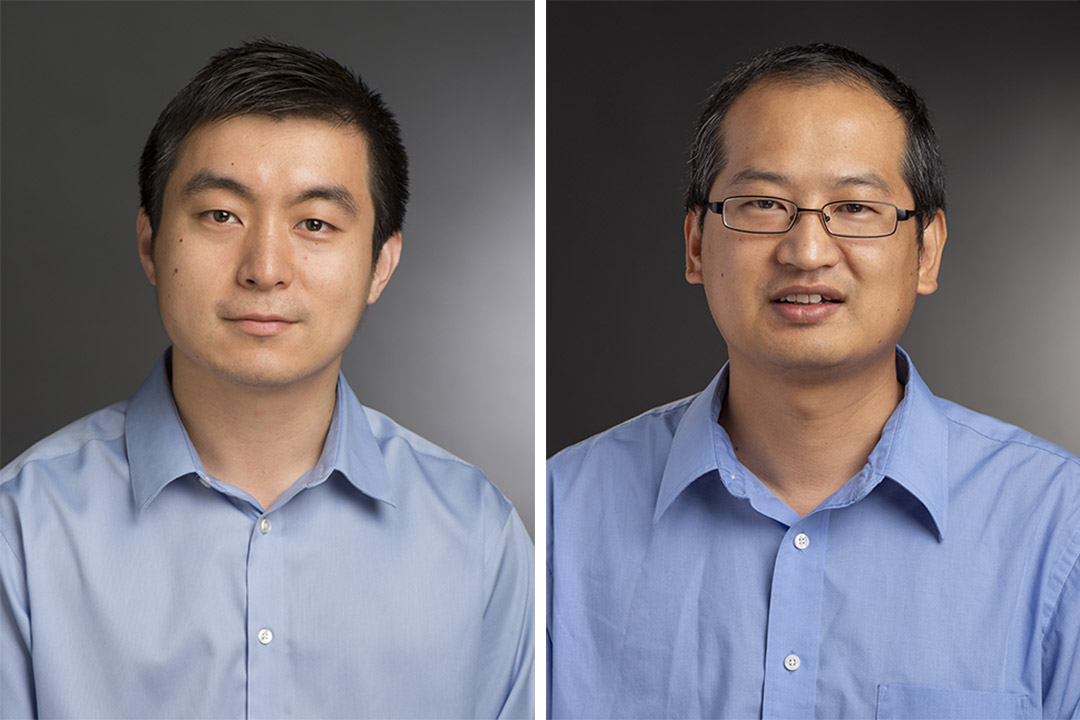Research team develops workforce training that integrates virtual reality, gamification
Multidisciplinary team from academia and industry builds comprehensive program to address shortages in machining industry
RIT engineering faculty-researchers Rui Liu, left, and Yunbo Zhang developed a machinists training program prototype combining virtual reality, gamification, sustainability, and cybersecurity.
More than 1,000 openings in the Finger Lakes region for skilled machinists are projected in the coming years. Labor trained by local academic and workforce programs are expected to fill only a small percentage of those needed. Shortages will come about because of retirements, but also because fewer apprentices are seeking positions in the field.
Local academic researchers and industry partners are developing new training options to fill the expected gaps—integrating gaming and virtual reality to appeal to a younger generation of manufacturing professionals.
Rochester Institute of Technology researchers Rui Liu and Yunbo Zhang received a $650,000 grant from the National Science Foundation’s Advanced Technology Education (ATE) program as part of the NSF’s focus on the future of work and the integration of technology with training and learning. The project uses new technologies such as artificial intelligence and virtual reality to benefit trainees by increasing skills needed in industries today and allowing for those who may be deaf or hard-of-hearing better access to career fields in need of machinists.
“Is there an easier way to get machinists trained? We are looking to bridge the gap between supply and demand, those interested and the companies that need skilled people to fill these important jobs,” said Liu.
Zhang agreed. “This area is very special and this is a cross-college, multiple-institution project that includes different sectors of the workforce because the nature of this problem is not something that only one department or one sector can solve. We have included people we think are essential to solving this problem.”
Liu and Zhang, both faculty-researchers in RIT’s Kate Gleason College of Engineering, lead a team that consists of campus partners from the university’s Golisano College of Computing and Information Sciences, the Golisano Institute for Sustainability, as well as faculty from the ESL Global Cybersecurity Institute. Monroe and Finger Lakes community colleges have faculty involved as well as those from regional BOCES programs. Industry partners such as Gleason Works and input from regional economic development representatives round out the team.
Project members are developing and field testing a set of training modules based on the cognitive apprenticeship model—instruction that combines formal coursework and apprenticeships—for learning complex skills coupled with artificial intelligence and virtual/augmented reality.
Machining is a skillset needed to build and produce precision parts. Learning often begins with an apprentice working side-by-side with a seasoned professional. Trainees practice with supervision until they are able to work independently, often taking a year or more to master equipment and processes.
Both faculty researchers have done extensive work in gathering data about skills needs and gaps from the regional economic organizations. Findings indicate that while there are workforce gaps, the area is rich in varied industries with open positions, as well as academic institutions to provide levels of training development.
“Components of the program focus on modernizing machining education programs with new technologies,” said Liu. “We have integrated a lot of new technologies into this training program, including gamification. This a new concept. We think this might be the thing that attracts young people into industries. We are also adding some online training. For some prospective students from rural areas, it may not be easy to get to the area.”
Plans include preparation of customizable materials for some independent study, but also for integrating human behavioral considerations to better understand trainees’ background. Modules can provide information to fill gaps and update skills needed to address Industry 4.0 topics such as automation and monitoring, sustainable machining, and cybersecurity. But the core focus is on consolidating skills and requirements.
“Right now, we have very diverse training requirements, for students and for retraining current workers, with different requirements from college and from the companies, so that is the reason we want to make the training program flexible. Just trying to coordinate the curriculum from different training providers, each with their own machining training programs. All different materials, how can we synchronize them together?” said Zhang.
Added to this are different machines and systems to master as well as the multiple procedures to complete processes. And if apprentices want to attain degrees and further their education, recognized standards for coursework and experiences are needed, said Zhang.
“Students who complete their associate degree and want to finish with a bachelor’s degree might need courses and trainings they took to be compatible for transfer to four-year colleges,” said Zhang. “If students want to transfer, it will be really easy for them to evaluate their background. We can we synchronize the curriculum so they pursue a higher degree.”
Data from the U.S. Department of Labor indicates that 30 percent of the machinists today are over the age of 55 with retirements expected in the next 10 years. Nearby training institutes and community colleges can train more than 100 new machinists per year. In the Finger Lakes region, there are estimates of more than 800 to 1,000 job openings per year.
Training prospective machinists and updating current employees in the machining field is only one of several economic development initiatives underway in the region. RIT’s engineering college has been recognized for its online programming, and the university recently launched RIT Certified—an applied education and training pathway. Last month, Monroe Community College opened its Economic and Workforce Development Center. The combined resources of these and other training programs are aimed toward building a new economy workforce in the region.
The research team will continue curriculum development through the summer and begin module testing by the fall. Partners in the research program are: Liu and Zhang, both assistant professors from the Kate Gleason College of Engineering; Chao Peng and Hanif Rahbari, both assistant professors from the Golisano College of Computing and Information Sciences; and Michael Thurston, research faculty from the Golisano Institute for Sustainability. Collaborating partners are Monroe and Finger Lakes Community Colleges and the regional BOCES programs.






